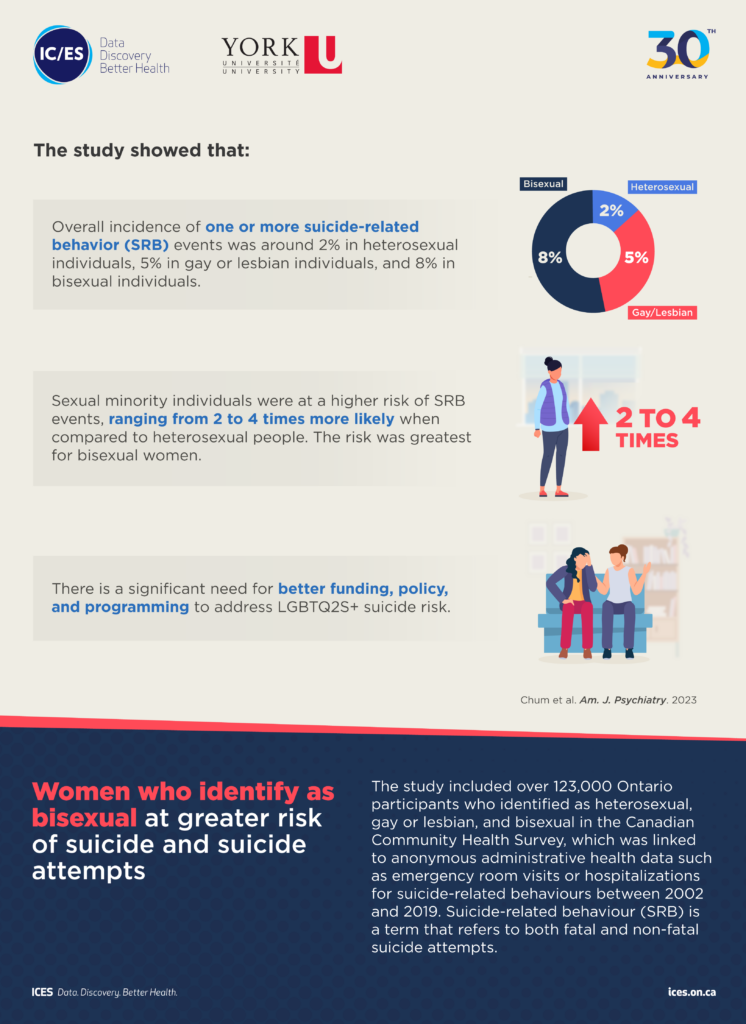
Bisexual women at higher risk of suicide and suicide attempts, study finds
Toronto, ON, June 7, 2023 – Women who identify as bisexual were more than three times more likely to attempt suicide compared to heterosexual women, according to a new study by a group of researchers at York University and ICES published online today.
The research, which is the first to link population-based survey data with health records for over 123,000 individuals, also found that gay men and gay women/lesbians were twice as likely to attempt suicide, both fatal and non-fatal, which the team refers to as a suicide-related behaviour (SRB) event, compared to heterosexual individuals. The findings point to an urgent need for better mental health supports within the LGBTQ+ community.
“We wanted to better characterize the disparity in suicide-related behaviours across sexual orientations and gender,” says lead author Antony Chum, a Faculty of Health assistant professor and Canada Research Chair in Population Health Data Science at York University and adjunct scientist at ICES. “Prior research on suicide attempts has mostly relied on self-reported data from surveys, which means we don’t have information on people who are too sick to participate or have died by suicide.”
Published in the American Journal of Psychiatry, the study looked at Ontario participants from the Canadian Community Health Survey, which was linked to anonymous administrative health data such as emergency room visits or hospitalizations for non-fatal self-harm and fatal suicide events between 2002 and 2019.

The researchers, who include York University postdoctoral fellows Gabriel John Dusing and Chungah Kim, found:
- Overall prevalence of one or more SRB events was around two per cent in heterosexual individuals, five per cent in gay/lesbian individuals, and eight per cent in bisexual individuals.
- Sexual minority individuals were at higher risk of SRB events, ranging from 2.10 to 4.23 times more likely when compared to heterosexual people.
- After adjusting for age and gender, the risk of a SRB event was more than three times greater among bisexual individuals, and this risk was most pronounced for bisexual women.

“The higher risk for bisexual women could be attributed to greater discrimination that bisexual people face within the LGBTQ+ community, as well as higher rates of violence, trauma, and caregiving burden that bisexual women may experience in opposite-sex relationships,” says Chum.
One limitation of the study is that data were not available for non-binary individuals and sexual orientations such as asexual and queer. Nevertheless, this was the first study to use a large representative sample linked with medical records, which improves the generalizability of the findings for other regions and populations.
“The study shows a clear need for better funding, policy and programming to address LGBTQ+ suicide risk,” says Chum. “We also need increased training for healthcare workers to address LGBTQ+ suicide risk. Further, we want to encourage hospitals and clinics to collect sexual orientation data as part of routine patient care.”
Chum also notes the increasing creep of healthcare privatization and that publicly funded mental health supports need to be increased not just for LGBTQ+ people, but across the board.
The findings align with the authors’ related study published in March in PLOS One, which found that both sexual minority status and residing in under-resourced neighbourhoods with poor access to healthcare, were independent risk factors for suicide-related behaviours. Future research needs to explore interventions that improve the mental health of LGBTQ+ people while addressing social determinants of health, such as neighbourhood-level disparities and barriers to healthcare.
